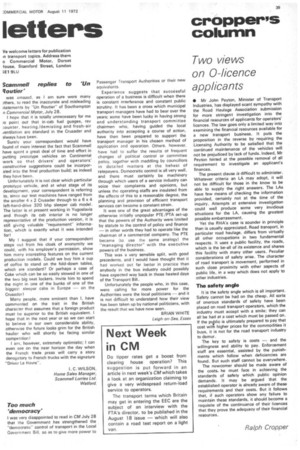cropper's column
Page 41

If you've noticed an error in this article please click here to report it so we can fix it.
Two views on 0-licence applicants
• Mr John Peyton, Minister of Transport Industries, has displayed scant sympathy with the Road Haulage Association submission for more stringent investigation into the financial resources of applicants for operators' licences. The law goes only a limited way into examining the financial resources available for a new transport business. It puts the proposition in the reverse by requiring the Licensing Authority to be satisfied that the continued maintenance of the vehicles will not be prejudiced by lack of funds. Indeed, Mr Peyton hinted at the possible removal of all requirement to investigate an applicant's finances.
The present clause is difficult to administer. Whatever criteria an LA may adopt, it will not be difficult for those in the know to be able to supply the right answers. The LAs have few means of checking the information provided, certainly not at the time of the inquiry. Attempts at extensive investigation could well produce some very invidious situations for the LA, causing the greatest possible embarrassment.
Yet the RHA's case is sounder in principle than is usually appreciated. Road transport, in particular road haulage, differs from virtually all other occupations in two fundamental respects. It uses a public facility, the roads, which is the be-all of its existence and shares this facility with many other users. Peculiar considerations of safety arise. The character of road transport is movement, performed in such close proximity with other aspects of public life, in a way which does not apply to other industries.
The safety angle
It is the safety angle which is all important. Safety cannot be had on the cheap. All sorts of onerous standards of safety have been placed on road transport operators, which the industry must accept with a smile; they can all be had at a cost which must be passed on. If the pu.blic is ultimately prepared to pay that cost with higher prices for the commodities it buys, it is not for the road transport industry to demur.
The key to safety is costs -and the willingness and ability to pay. Enforcement staff are essential, assisted by the punishments which follow when deficiencies are found. But such staff cannot be everywhere.
The newcomer should be made aware of the costshe must face in achieving the standards of safety which public opinion demands. It may be argued that the established operator is already aware of these requirements and their costs. But it follows that, if such operators show any failure to maintain these standards, it should become a requisite of the continuance of their licences that they prove the adequacy of their financial resources.
Ralph Cropper




























































































